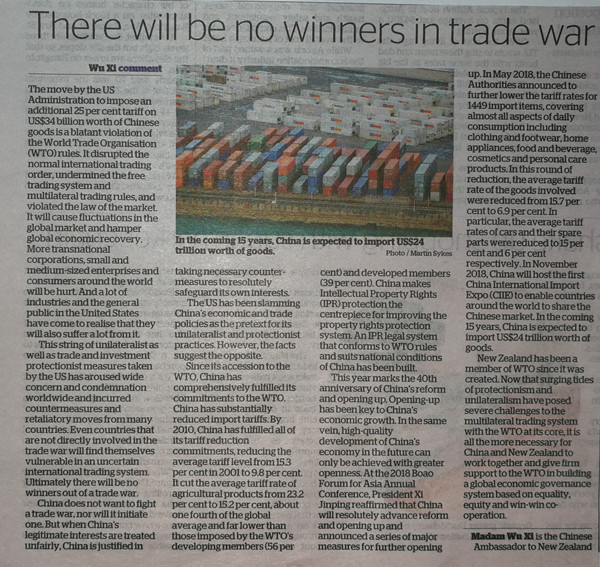On 16 July 2018, the New Zealand Herald and its website published a signed article by Ambassador Wu Xi entitled There will be no winners in trade war. The full text is as follows:

The move by the US administration to impose an additional 25% tariff on 34 billion dollars worth of Chinese goods is a blatant violation of the WTO rules. It disrupted the normal international trading order, undermined the free trading system and multilateral trading rules, and violated the law of the market. It will cause fluctuations in the global market and hamper global economic recovery. More transnational corporations, small and medium-sized enterprises and consumers around the world will be hurt. And a lot of industries and the general public in the US have come to realize that they will also suffer a lot from it.
This string of unilaterlist as well as trade and investment protectionist measures taken by the US has aroused wide concern and condemnation worldwide and incurred countermeasures and retaliatory moves from many countries. Even countries that are not directly involved in the trade war will find themselves vulnerable in an uncertain international trading system. Ultimately there will be no winners out of a trade war.
China does not want to fight a trade war, nor will it initiate one. But when China’s legitimate interests are treated unfairly, China is justified in taking necessary countermeasures to resolutely safeguard its own interests.
The US has been slamming China’s economic and trade policies as the pretext for its unilateralist and protectionist practices. However, the facts suggest the opposite. Since its accession to the WTO, China has comprehensively fulfilled its commitments to the WTO. China has substantially reduced import tariffs. By 2010, China has fulfilled all of its tariff reduction commitments, reducing the average tariff level from 15.3% in 2001 to 9.8%. It cut the average tariff rate of agricultural products from 23.2% to 15.2%, about one fourth of the global average and far lower than those imposed by the WTO’s developing members (56%) and developed members (39%). China makes Intellectual Property Rights (IPR) protection the centerpiece for improving the property rights protection system. An IPR legal system that conforms to WTO rules and suits national conditions of China has been built.
This year marks the 40th anniversary of China’s reform and opening up. Opening-up has been key to China’s economic growth. In the same vein, high-quality development of China’s economy in the future can only be achieved with greater openness. At the 2018 Boao Forum for Asia Annual Conference, President Xi Jinping reaffirmed that China will resolutely advance reform and opening up and announced a series of major measures for further opening up.
In May 2018, the Chinese Authorities announced to further lower the tariff rates for 1449 import items, coverning almost all aspects of daily consumption including clothing and footware, home appliances, food and beverage, cosmetics and personal care products. In this round of reduction, the average tariff rate of the goods involved were reduced from 15.7% to 6.9%. In particular, the average tariff rates of cars and their spare parts were reduced to 15% and 6% respectively. In November 2018, China will host the first China International Import Expo (CIIE) to enable countries around the world to share Chinese market. In the coming 15 years, China is expected to import US$24 trillion worth of goods.
The world is undergoing a new round of major development, great change and profound readjustment. Economic globalization has powered global growth and is an irreversible trend of our times. China and the multilateral trading system stand together through thick and thin. China will continue to fulfill its commitments under WTO, comply with rules, actively participate in the improvement of the multilateral trading system and the global governance system. By doing so, we will be able to build a new type of international relations and promote a community with a shared future for mankind.
New Zealand has been a member of WTO since it was created and has always been in support of rules-based international order. Now that surging tides of anti-globalization, coupled with rising protectionism and unilateralism, have posed severe challenges to the multilateral trading system with the WTO at its core. It is all the more necessary for China and New Zealand to work together and give firm support to the WTO in playing a greater role in global economic governance, and to building a global economic governance system based on equality, equity and win-win cooperation.